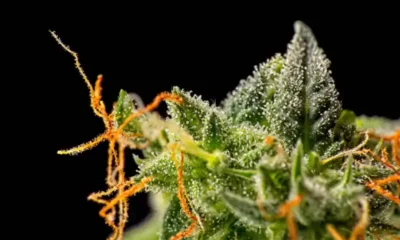Connect with us
Published
2 years agoon

As research surrounding the efficacy of psychedelic treatment for major depressive disorder symptoms in adults continues to emerge, one outstanding question points to how long these antidepressant effects will impact participants.
While previous studies by Johns Hopkins Medicine have shown psilocybin treatments relieved symptoms for up to a month, a new follow-up study of those participants notes that the treatment’s effects, given with supportive psychotherapy, could last up to a year in some patients. A report on the new study was published February 15, 2022 in the Journal of Psychopharmacology.
Natalie Gukasyan, M.D., assistant professor of psychiatry and behavioral sciences at the Johns Hopkins University School of Medicine, expanded, “Our findings add to evidence that, under carefully controlled conditions, this is a promising therapeutic approach that can lead to significant and durable improvements in depression.” She notes that the results they observed are in a research setting and require a lot of preparation and structured support from trained clinicians and therapists and cautioned people to not attempt these types of therapies on their own.
For the new study, researchers recruited 27 participants with a long-term history of depression, the majority experiencing depressive symptoms for approximately two weeks prior to recruitment. The mean age of the participants was 40, with 19 women, 25 identifying as white, one as African American, and one as Asian. Of the participants, 88 percent had previously been treated with standard antidepressant medications, and 58 percent reported using antidepressants to treat their current depressive episodes.
Following the initial screening, participants were randomly placed into one of two groups: One group received intervention immediately, the other after an eight-week waiting period. Each group was provided with six to eight hours of preparatory meetings with two treatment facilitators at the time of treatment. After this, they received two doses of psilocybin, approximately two weeks apart, between August 2017 and April 2019 at the Behavioral Biology Research Center at Johns Hopkins Bayview Medical Center.
Each participant returned for a follow-up one day and one week after each session, followed by additional follow-up appointments at one, three, six and 12 months after the second session. In total, 24 participants completed both psilocybin sessions and all follow-up assessments.
The results note that psilocybin treatment in both groups resulted in large decreases in depression, with depression severity remaining low throughout each follow-up visit after treatment. The researchers measured depressive symptoms before and after treatment using the GRID-Hamilton Depression Rating Scale, in which a score of 24 or more indicates severe depression, 17-23 moderate depression, 8-16 mild depression, and below seven indicating no depression.
For most participants, the scores of the overall treatment dropped from 22.8 at pretreatment to 8.7 at one week, 8.9 at four weeks, 9.3 at three months, seven at six months and 7.7 at 12 months following treatment.
Roland Griffiths, Ph.D., the Oliver Lee McCabe III, Ph.D., Professor in the Neuropsychopharmacology of Consciousness at the Johns Hopkins University School of Medicine and founding director of the Johns Hopkins Center for Psychedelic and Consciousness Research, said that psilocybin not only produces significant and immediate effects, but pointed to the long duration, which he said suggests it could be a “uniquely useful new treatment” for people suffering from depression and depressive disorders.
“Compared to standard antidepressants, which must be taken for long stretches of time, psilocybin has the potential to enduringly relieve the symptoms of depression with one or two treatments,” Griffiths said.
Researchers emphasized that further research is still needed to explore the possibility of treatment efficacy beyond 12 months, as it could potentially be a much longer duration. In any case, the research is assuring news that psilocybin medicine could indeed provide long-term relief to people who need it in the near future.


Despite City Efforts, Hemp Shops Posing as Dispensaries Prevail in Las Vegas


Cannabis Community, Investors React to DEA Decision To Reschedule


Georgia Governor Signs Bill Establishing Licensing Requirements To Grow Hemp


Study: Psilocybin Enhances Meditation


Ohio GOP Lawmakers Debate Adult-Use MJ Priorities, Eye June for Regulation Approval


Taylor Swift Puts Narcotics Into All of Her Songs on ‘The Tortured Poets Department’
